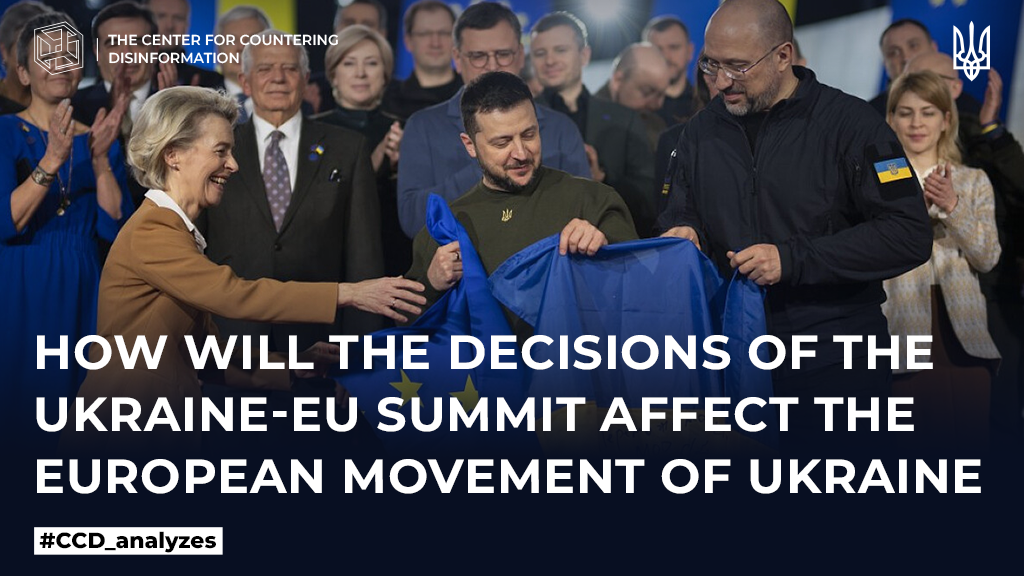The “Ukraine-EU” summit in Kyiv, with the participation of the country’s leadership and top EU officials, became a landmark event. Firstly, it was the first time in the history of the EU that it took place on the territory of a state in which the war is ongoing, and secondly, it became a signal that, despite the skepticism of individual EU members, Ukraine can speed up European integration and become a member of the EU already this decade.
As for the political component of the summit’s decisions, the joint statement of Kyiv and Brussels contains quite categorical statements devoted to resistance to the russian aggression. Separately, the EU expressed support for Zelenskyy’s “peace formula” — this is also an important political signal on the eve of the Peace Formula Summit, which the Ukrainian side plans to hold in the near future.
The European Commission’s economic assessment of Ukraine’s ability to join the EU is contained in an analytical report that Ursula von der Leyen personally handed over to the President of Ukraine.
☝️ The document “Analytical report supplementing the conclusions of the European Commission regarding Ukraine’s application to join the European Union” is, in fact, an extraordinary audit of the country’s approach to EU law. In general, such an assessment by the EU is given to candidate states once a year (Ukraine will receive it in October of this year). Therefore, the current report on Ukraine is interim and abbreviated and does not contain an assessment of the key chapter for the EU, “justice and fundamental rights”, the assessment of which has been postponed until autumn. The methodology for evaluating the EU candidate states involves the study of the degree of approximation of the real situation in the candidate state to European law and practice. The assessment is based on a 5-point system: 1 – initial level, 2 – some compliance with EU law, 3 – moderate compliance, 4 – good compliance, 5 – advanced level. In total, the degree of adaptation of the legislation of the candidate country to European law is subject to assessment in 33 blocks, the so-called “negotiating heads”, which are decisive in drawing up a positive opinion of the European Commission on candidacy. Only after that, Kyiv will be able to claim to proceed to the official start of negotiations on joining the EU.
High-ranking officials from Brussels showed the Ukrainian authorities two complementary signals.
+
The first positive signal is the announced and confirmed message from the EU leadership about reaching an agreement with all member states on the accession of Ukraine. According to the EU assessment, for 4 out of 33 “negotiating chapters” Ukraine received a really high score – “4”, that is, confirmation of “good compliance”. This is the “Customs Union” block, energy, foreign policy and security policy. In another 5 areas, we received a “3” (“moderate compliance with EU law”), which is generally a good score for a novice candidate. This is how the regulatory framework in the field of free movement of goods, digital transformation and media, economic and monetary policy, science and research was assessed. In the field of providing digital services to the population and business, Ukraine is at a progressive level.
The second signal is more critical, designed to prove to the Ukrainian authorities the scale of challenges and tasks that Ukraine must solve before joining the EU.
The European Commission confirms that, against the background of good potential for growth, European integration processes remain unsystematic, and public statements about high readiness for joining the EU are exaggerated. For the 8th out of 33 “negotiating chapters” Ukraine was given the lowest score of “1” (that is, there Ukraine is at the initial level of compliance with the standards of the European Union). The level of adaptation to the European requirements of Ukrainian legislation in matters of financial control standards, free movement of workers, intellectual property, social policy, environmental and climate protection, as well as legislation in the field of agriculture and fishing received such an assessment from the European Commission. For 15 of the “negotiating chapters”, Ukraine received a “2” (that is, it demonstrated only a fragmentary implementation of European norms). Ukrainian legislation in the sphere of justice, freedom and security, as well as state procurement, statistics, capital movements, corporate law, competition, protection of consumer rights and health, and taxation were evaluated in this way.
In total, for 32 chapters, Ukraine scored 69 points (according to this methodology, Montenegro has 99.5 points, Serbia – 98, Turkey – 94, Albania – 84, Georgia – 67, Moldova – 55). That is, according to the actual degree of readiness, Ukraine ranks last in the Euro-rating among the Eastern Partnership states.
❗️ The analysis conducted in Brussels will in no way reduce Kyiv’s ambition to achieve European integration. Despite the critical assessments, the Ukrainian authorities are convinced that they will be able to concentrate their efforts and achieve significant progress in increasing the evaluation of the “Europeanness” of those “negotiating chapters” where Ukraine lags behind. In particular, according to the recommendations of experts, it will be necessary to bring technical criteria up to European standards and reform the Constitutional Court.










